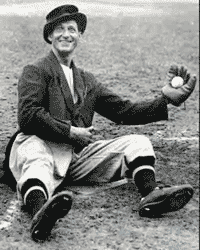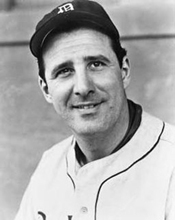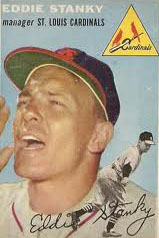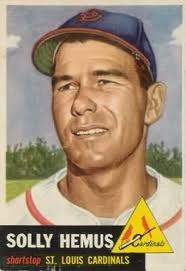|
|
Six Cards Caught Stealing
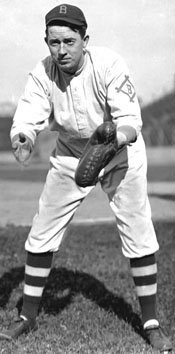
Bill Bergen |
The Cardinals pounded the Brooklyn Superbas 9-1 in the second game of a doubleheader on August 24, 1909, at Washington Park in Brooklyn.
- The score might have been even more lopsided had not Brooklyn C Bill Bergen set a record by throwing out six base runners attempting to steal.
- Bergen had already established a reputation for a lively arm. While in the minor leagues, he single-handedly got his team out of a bases loaded jam by picking off all three base runners!
- During the '09 season, Bill amassed 202 assists, ninth best all-time for catchers.
- He could fire the ball quickly and accurately while remaining flat-footed.
Apparently, there was no gentleman's agreement in 1909 that the team with a comfortable lead in the late innings doesn't try to steal.
- In the 9th, Ed Konetchy, on first with a walk, successfully stole second to break Bergen's string.
- It was the first Cardinals' theft since the four-run first, when leadoff man Jap Barbeau stole second.
- Bill got some revenge in the bottom of the ninth when he walked and then stole second, one of 23 thefts in his big league career.
Some articles on the doubleheader, including one in the New York Times, credit Bergen with catching seven Cardinals stealing.
- However, Joe Dittmar (cited below) examined 15 newspapers and concluded Bergen nailed only six runners.
- Joe also confirmed that Wally Schang of the Philadelphia Athletics matched Bergen's feat on May 12, 1915.
- A little over a month later, on June 18, 1915, A's catchers again caught six potential stealers, but three different backstops shared in the record.
|
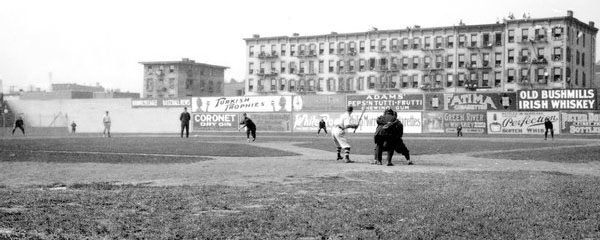
Washington Park, Brooklyn, in 1912
Notice the absence of a pitching mound; also two umpires.
On August 24, 1909, when Bergen set his record, the only ump was the famous Bill Klem,
who must have stood behind the P.
Bergen holds another distinction, this one unflattering.
- He batted .170 in 3,028 AB with the Cincinnati Reds and the Superbas.
- No one has ever played so long and hit so poorly, making Bergen "without question, the worst hitter in the history of baseball."
- But the game described above shows why he stayed in the majors for eleven seasons. Charles Faber in Baseball Ratings puts Bergen in third place in fielding among all NL catchers behind Hall of Famer Gabby Hartnett and Pop Snyder (1873-91).

Flint Rehm
|
On
August 10, 1930, the St. Louis Cardinals found
themselves in fourth place, just two games over .500 and 11
games behind the league-leading Brooklyn
Dodgers. Then the Redbirds (who weren't called the "Gashouse Gang" until 1934) caught fire. They finished August 23-9 and continued red hot into September.
On Tuesday, September 16, the Cards started a
three-game series in Brooklyn. The first-place Dodgers led them by one game.
- Manager Gabby Street
chose right-hander Flint Rhem, winner of six
in a row, to open the series against Dodger
ace Dazzy
Vance.
- Flint had toiled
for St. Louis since 1924. His best year was
1926, when he went 20-7 and won a game during the World Series
upset of the mighty Yankees.
- However, Rhem, who had battled the bottle his
whole career, was nowhere to be found as the team prepared for
the crucial opener. So Street replaced Flint
with lefthander "Wild Bill" Hallahan
(who would lead the NL in both strikeouts and walks in 1930
and 1931).
- This choice posed a problem also. The night before, Bill caught his right hand in a taxicab door,
severely bruising two of his fingers. Since the injury was to
his non-pitching hand, the lefty took the mound and pitched
the game of his life.
|
Vance,
a future Hall of Famer, carried a no-hitter into the seventh, but
Hallahan did him one better, not allowing a hit until
the eighth.
- In the top of the tenth, pinch hitter Andy High
drove in the game's only run to propel the Cards
into a first place tie.
- In the second game (which some sources incorrectly
say was part of a doubleheader), Street's gang scored
all its runs in the last two innings for a 5-3 win and a one-game
lead.
- Then on Thursday the Cards completed the sweep
4-3 behind Burleigh Grimes, the last of the legal spitballers and
another future Hall of Famer.
In
the meantime, Rhem returned to the club after being
AWOL for two days.
- He told Street he had been kidnapped
by two men who drove him to a house in New Jersey where they forced
him at gunpoint to drink shot after shot of whiskey.
- Flint claimed they were gamblers betting heavily
on Brooklyn who wanted
to keep him from pitching.
- Street decided not to
fine Rhem because of his clever tale.
- Years later, Hallahan revealed the real story. Some friends from
back home in South Carolina had come up to see the games and invited
Flint out for a few drinks. Like most alcoholics,
when he started, he couldn't stop.
The
Cards finished the 15-game road trip with five games
against the Phillies.
- Rhem was the winning pitcher in the final game, a
19-16 slugfest.
- St. Louis never relinquished the
lead, clinching the pennant at home on the last Friday against the
Pirates.
- The Cardinals
compiled a fantastic 21-4 record in September.
Rhem
started the second game of the World Series against the Philadelphia
Athletics but didn't survive the fourth inning, giving
up all six runs in the 6-1 defeat.
- St. Louis lost
the Series 4 games to 2 but turned the tables on the A's
the next year in seven games.
- Rhem pitched only one
inning in the 1931 Fall Classic.
- The Cardinals traded
him to the Phillies
in 1932.
- He finished his career 105-97 after the 1936 season.
Baseball
Vignettes Archive | Top
of Page
Even the Greats Have Bad Days: Jim Bottomley
Left-hand hitting 1B Jim Bottomley compiled a .310 batting average during his 16-year ML career, the first 16 of which were with the St. Louis Cardinals. He was elected to the Hall of Fame by the Veterans Committee in 1974, 15 years after his death at age 59.
- He twice led the NL in RBI and total bases (1926 and 1928) and in doubles (1925-26).
- Sunny Jim hit .345 in his first World Series, helping the Cards upset New York in 1926. Two years later, he hit only .213 in the sweep by those same Yanks.
So neither Jim, his manager and teammates, nor the fans were prepared for his abysmal performance in the 1930 Fall Classic against the Philadelphia Athletics.
- Bottomley managed only one hit, a double, in 22 AB in the six-game A's victory. That's .045, decades below the Mendoza Line years before that term was invented. The only Fall Classic performance that's been worse was Gil Hodges 0-for-21 in 1952 for the Brooklyn Dodgers against the Yankees.
- Jim led all batters in strikeouts with 9 against Connie Mack's formidable left-right mound duo of Lefty Grove and George Earnshaw.
- Sunny's lone safety came in the 8th inning of Game 3 at St. Louis. He doubled over first with one out and then scored his only run of the Series on Chick Hafey's double.
- Several times Bottomley failed to advance or plate a runner.
- Game Two: Jim flied to CF to end the first inning with 2B Frankie Frisch on second.
- Game Five: With the teams tied with two wins apiece and the game scoreless in the bottom of the eighth, Sunny Jim struck out for the third straight time with Frisch on first. In the top of the ninth, Jimmy Foxx smashed a two-run HR deep into the LF bleachers for a 2-0 A's win.
- Game Six: Manager Gabby Street dropped Bottomley to sixth in the order, with Frisch taking over the cleanup spot. But the move didn't help, although Jim walked in the 7th and 9th in the 7-1 loss against Earnshaw.
Bottomley and his Cardinal mates got another crack at Philadelphia the following season.
- Led by a sensational performance from rookie CF Pepper Martin, who hit .500 and stole five bases, the Cards prevailed in seven games.
- However, Jim hit only .160 (4-25). He did manage 2 RBI.
- He would not play in another World Series. After his huge 1926 debut, his final average for 24 post-season contests was only .200.
|
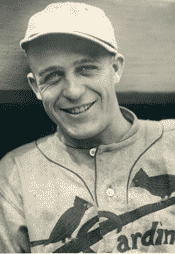
Jim Bottomley
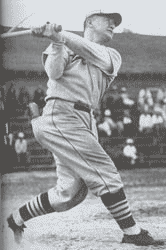
Frankie Frisch
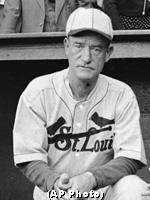
Gabby Street
|
Diz's Interesting '34 – I
Dizzy Dean's 1934 season was one of the most interesting any player has ever had. That year he won 30 games – the last NL hurler to do so – to lead the St. Louis Cardinals to the pennant. Along the way, there were quite a few zany and even ugly incidents. Dizzy is probably the player in baseball history most like Babe Ruth in that he was an overgrown fun-loving kid – but without Babe's drinking and womanizing.
- A natural showman who loved calling attention to himself, Dizzy started a fire with paper in front of the Cardinals dugout on a 100º day in St. Louis, wrapped himself in a blanket, and did a war dance, presumably to evoke cooling rain.
- At Braves Field, Dizzy pantomimed a man shaving and scattered sneezing powder in front of the Boston dugout.
- Another day, when the hated New York Giants, who led the league most of the season, came to Sportsman's Park, Dizzy went into the visitors' locker room, sat down, and instructed manager Bill Terry and his hitters on how he intended to pitch them.
- Dizzy also revealed a contentious side of his nature. On June 1, in Pittsburgh, he staged a one-game "strike," sitting in the stands to protest Paul's low salary. (Dizzy made $8,500 in 1934. Paul, a rookie, earned $3,000.)
- In mid-August, Dizzy talked Paul into joining him in boycotting the team's trip to Detroit for an open-date exhibition game following a Sunday home DH in which they both pitched. Player-manager Frankie Frisch fined Diz $100 and Paul $50. Diz responded by kicking items around the clubhouse, then tearing his two jerseys to shreds. For that, he received a ten-day suspension. Diz traveled to Chicago to plead his case before Commissioner Kennesaw Landis, who ruled in favor of the club. Diz's losses in fines, compensation for the jerseys, and lost wages amounted to $486. On August 26, in his first start after his suspension, Dean shut out the Giants on five hits for his 22nd win.
- Down the stretch, the Deans carried the Cardinals just as Diz had predicted in spring training when he promised that "me and Paul" would win 40 games. They surpassed that by 9, Paul adding 19 wins to Diz's 30. That brought the Cardinals to the World Series against the Detroit Tigers where more adventures awaited.
Continued below ...
Reference: Breaking the Slump: Baseball in the Depression Era, Charles C. Alexander
|
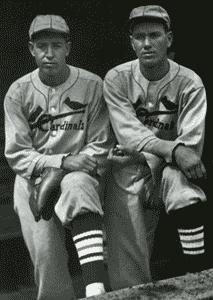
Paul and Dizzy Dean

Frankie Frisch
Top of Page |
Diz's Interesting '34 – II
|
The 1934 World Series capped a year that made the St. Louis Cardinals' Gashouse Gang one of the most famous teams in baseball history. In particular, it cemented Dizzy Dean's popularity with the public.
- When the Cardinals arrived in Detroit the day before Game One, Diz waved his big hat to the crowd that was yelling "We want Dean!" At the hotel, he hobnobbed with celebrities Mae West and Will Rogers and held court for a small army of reporters.
- Before the start of Game One, Diz posed for photographs with anyone who asked and clowned with baseball comedian Al Schacht, who jumped on Diz's back. Predating Mohammed Ali by 25 years, Diz taunted Tiger star Hank Greenberg. "Hey, Mose!" (A racial slur since Hank was Jewish.) "What makes you so white? Boy, you're a-shakin' like a leaf."
- Diz won the first game, 8-3, with a workmanlike performance. That evening, at the local CBS radio station, he spoke by short wave to the explorer Richard Byrd, who headed an expedition at the South Pole. "Howdy there, Dick Byrd down at the South Pole," said Diz. "I didn't have nary a thing on the ball. It was a lousy, tick-flea-and-chigger-bit ball game."
- The next morning, Dizzy ate breakfast with his wife and brother and comedian Joe E. Brown as guests of Henry Ford at the latter's mansion outside Detroit. Ford had paid MLB $100,000 for the exclusive advertising rights for the first national broacast of the World Series. The visit included a tour of Greenfield Village, the 19th-century town that Ford had recreated. Then the Deans sped back to the city with a police escort.
- After the Tigers won Game Two, the series moved to St. Louis, where Paul scattered eight hits in a 4-1 victory.
- Diz didn't pitch the fourth game but was involved in one of the most famous incidents in his colorful career. With Detroit leading 4-3 in the fourth, Diz went in to run for PH Spud Davis in the bottom of the inning. It's not clear whether Dean did this on his own or under Frisch's command. At any rate, Pepper Martin hit a DP grounder to 2B Charlie Gehringer who tossed to SS Billy Rogell. Rogell's throw to first hit Dean in the forehead, dropping him like a rock. The crowd of 38,000 fell silent as their star was carried off the field. Diz regained consciousness in the locker room and immediately announced he would take his turn the next day. "You can't hurt no Dean by hittin' him on the head." Within a week, millions of Americans had watched movie newsreels of the incident, adding to Dizzy's fame.
- Diz pitched well in Game Five but lost 3-1. Back in Detroit, Paul got the must win in Game Six, 4-3. That set the stage for the final, with Diz toeing the slab on one day's rest.
- The ultimate contest was a disappointment to Tiger fans. Diz got two hits in the third inning as the Cards tallied 7 en route to an 11-0 rout.
Dizzy still had more baseball to play and appearances to make before spring training 1935.
To be continued ...
|
Diz's Interesting '34 – III
The day after their 1934 World Series victory, the St. Louis Cardinals arrived home in St. Louis. Dizzy Dean wasted no time in capitalizing on his nationwide fame.
- Dizzy exited the train wearing a paper pith helmet and waving a rubber toy tiger. The Cardinals went on an automobile parade through the business district. In New York City, Army recruiters hung a poster that capitalized on Dizzy's brief Army stint in 1929 to claim "The Army Trained Him."
- Diz and his brother Paul flew to Oklahoma City the next day. That night, Diz pitched for his All-Stars, a ragtag barnstorming team composed of his brother plus various minor leaguers and semi-pro players, against the Kansas City Monarchs of the Negro League. The teams traveled to Chicago, Cleveland, Columbus, and Pittsburgh. During the tour, Diz faced the legendary Satchel Paige several times.
- The Dean brothers also made a series of appearances at the Roxy Theatre in Manhattan. Then Diz traveled across the continent to pitch briefly in the California Winter League, including another game against Paige.
- Dizzy and Paul appeared in a movie, Dizzy and Daffy, made in Hollywood for Vitaphone Pictures. They clowned around with Shemp Howard (before he became one of the Three Stooges). This movie cemented Paul's nickname for the rest of his life.
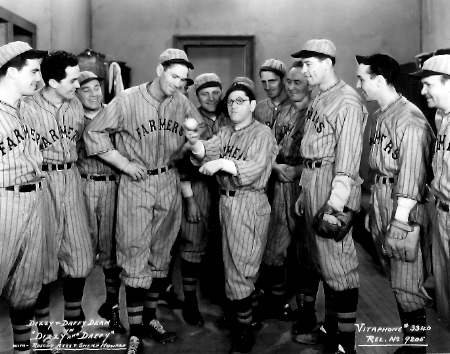
Dizzy made about $25,000 for the year, a small fortune in the middle of the Great Depression and not bad for an uneducated country boy.
- $5,941 as a member of the Series winners
- $3,000 for product endorsements and a local weekly radio appearance
- $8,000 for his barnstorming and theater appearances
|
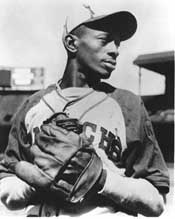
Satchell Paige
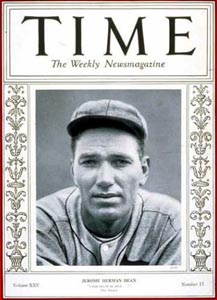
Dizzy Dean on the cover of Time, April 1935
Top of Page |
Reference: Breaking the Slump: Baseball in the Depression Era, Charles C. Alexander

Paul and Dizzy Dean, 1934
|
Dizzy Dean, starting his third full season with the Cardinals, pitched the 1934 opener before a disappointing crowd of only 7,500 at Sportsman's Park in St. Louis.
- Throwing harder in the ninth than in the first, Dizzy mowed down the Pittsburgh Pirates 7-1.
- After the game, Diz was more interested in talking about his rookie brother Paul. I guess the ol' flipper ain't changed none, but wait'll you fellas see my brother, Paul, tomorrow. He'll show 'em what this family has for breakfast.
- Diz had so much faith in himself and his sibling that before the season he had promised that "me 'n Paul" would win 45 games.
Paul Dean was only 20 years old, two years younger than Diz. At 6' 175 pounds, he was also two inches shorter.
- Paul started well against the Pirates. He struck out the first two batters, Lloyd Waner and Fred Lindstrom.
- However, Lloyd Waner singled and Pie Traynor homered for a quick 2-0 lead.
- In the second, Gus Suhr hit a lead-off HR and P Larry French doubled in a run to send the younger Dean to the showers.
- The Cards rallied to tie the game at 6 only to lose on Cookie Lavagetto's eighth-inning HR.
- Trying to cheer up his little brother, Dizzy said, "You didn't lose that game, boy. It ain't gonna count against you."
Player-manager Frank Frisch, who called all the pitches from 2B, told Paul afterwards, You've got the speed, but it won't matter how hard you throw. If it's down the middle, these fellows are going to hit it. Frisch decided to use Paul out of the bullpen to take the pressure off him.
|
After the Pirates took two-of-three from the Cardinals to start the 1934 season, the Chicago Cubs came to St. Louis for a two-game series. The Cubs' Charlie Root outdueled Tex Carleton 2-1 in the first game. Then Dizzy Dean toed the slab on Sunday, April 22.
- The Cubs still stewed from a game Diz pitched against them the previous July. After striking out 17 at Wrigley Field, Dean had ridiculed the home team in an interview on a Chicago radio station after the game. He had singled out Guy Bush, his mound opponent that afternoon: They had boys like him down in the Texas League takin' care of our bats. He ain't got nothin'. Bush happened to be listening and spread the word to his teammates.
- Guy got some revenge on September 4, 1933, before 38,000 at Wrigley Field when he defeated the Cardinals 6-4 as the Cubs drove Diz from the mound with a six-run second.
Lon Warneke faced Dean this time, but Bush got great pleasure in the dugout from the results.
- Chicago swatted six hits for four runs in the first. When Frisch went to the mound to talk to his hurler, the Cubs hollered, Leave the son of a bitch in, Frank. We're not through yet.
- When the visitors tallied two more in the second, Diz headed to the showers. Bush couldn't resist: Tell them on the radio how good you were, squirt.
- Afterwards, Diz replied in the clubhouse: Them Cubbies can kiss my ass. [Baseball is so much more gentile today!]
- The Cubs garnered six hits and two runs in two innings against Paul Dean, who replaced his brother.
- The visitors creamed the Cards 15-2 behind Warneke's second straight one-hitter to start the season.
Like the Pirates before them, the undefeated Cubs left St. Louis convinced the Cardinals were destined for no better than fifth place, where they had finished in '33.
Paul Dean's travails were not over.
- He appeared in relief April 28 in Chicago but against lasted only two innings, giving up a long HR to Chuck Klein, who had just come to the Windy City from the Phillies. That outing raised the younger Dean's ERA to 7.50.
- Frisch tried Paul again on May 3 at home against Philadelphia. The Phillies touched him for seven hits and three runs in five innings. However, Paul recorded his first ML victory as LF Joe Medwick's grand slam sparked the Cards' 8-7 victory.
Some Cardinals grumbled about Paul Dean taking up a roster spot.
- Tex Carleton, who resented Paul starting the second game of the season ahead of him, opined: He doesn't have a curve. No pitching finesse.
- Another anonymous P said, Paul's just a thrower who struck out a lot of guys under the lights at Columbus. He'll have to return and learn some advanced technique.
- Still another: If he wasn't Diz's brother, he'd be long gone. That's the only reason they're keeping him up here.
- As might be expected, Diz stood by his brother. We're gonna still win them 45 games. He'll be all right if them goddamned coaches don't ruin him by tryin' to make him over. I want 'em to lay off that kid.
Frisch treated Paul to a steak dinner shortly afterwards.
- The skipper told his rookie not to imitate Dizzy's style on the mound but to trust his own stuff.
- Frisch also promised Paul that he would start the third game of the series against the defending World Champion New York Giants. Frank then went over every Giant batter, even assuming stances alongside the table.
Paul Dean defeated the Giants 3-2 on May 11 in ten innings in St. Louis, outdueling the great Carl Hubbell. The Deans went on to exceed Dizzy's promised 45 victories by four (Diz 30, Paul 19) as The Gashouse Gang won the NL pennant and the World Series.
|
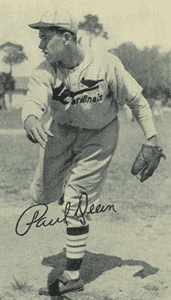
Paul Dean, 1934
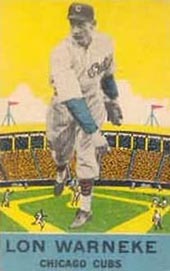

Frankie Frisch
|
Reference: Diz: The Story of Dizzy Dean and Baseball During the Great Depression, Robert Gregory |
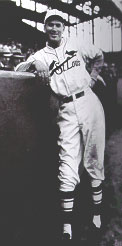
Dizzy Dean
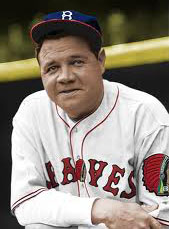
Babe Ruth
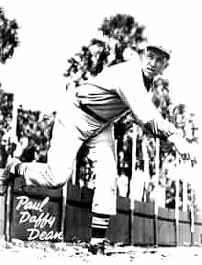
Paul Dean
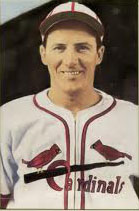
Joe Medwick
|
You never knew what to expect from Dizzy Dean. The year after the Cardinals won the World Series in 1934, Diz embarked on new adventures on and off the field.
- April 16
Dean starts the season opener in 34° weather at Wrigley Field but doesn't last long. A drive off the bat of Freddie Lindstrom in the first inning smacks Diz in the left ankle, and he has to be carried from the field. However, he recovers to start again five days later.
- May 5
Dizzy faces 40-year-old Babe Ruth for the first time during the regular season as the Cards face the Boston Braves before an excellent Sunday turnout of 30,000 in Boston.
Ruth walks in the first inning. Then in the second, Dizzy whacks a pitch over Ruth's head into the LF bleachers as part of a 6-run inning. When the Babe steps up the second time, a grinning Diz waves his outfielders back to the fences, then fans the Bambino on a 1-2 pitch. After Ruth grounds out in his next plate appearance, he retires for the day. Diz gives up ten hits but no runs in the 7-0 victory. Realizing he will never become manager of the Braves, Babe retires on May 30.
- May 21
Dean is ejected from a 7-6 loss to the Phillies at Sportsman's Park.
The shenanigans began when Diz's younger brother Paul hits Lou Chiozza with a pitch in the 4th inning. Philadelphia coach Hans Lobert accuses "Daffy" of throwing a bean ball, which provokes the younger Dean to drop his glove and square off. Diz, anxious to be his brother's keeper, rushes from the bench, but the umpires intervene to stop any potential hostilities. In the 5th, Paul hits Al Todd, who drops his bat and starts for the box. Dizzy, who feuded with Todd when they played in the Texas League, again leaps out to back up "L'il Paul" as players from both dugouts swarm the field. A few belligerent punches are traded, but the free-for-all subsides after two teammates corral Diz, who is led from the diamond by police. The crowd of 2,500 cheers his departure.
- June 4
The 30-game winner of 1934 turns petulant in the 3rd inning in Pittsburgh when the Pirates score 4 with the aid of two errors. Two innings later, the Bucs add 4 more, causing Diz to start lobbing the ball to the plate. In the dugout, Dean accuses his teammates of quitting. That provokes the ire of Joe Medwick, who counters that Diz is the one laying down. Joe grabs a bat to defend himself as Diz and Paul move toward him. The elder Dean and Joe square off in full view of the spectators before other players pull them apart.
In a meeting in the clubhouse after the 9-5 loss, manager Frank Frisch sides with the rest of the players against Dean.
Still seething, Diz tells reporters: The best thing the Cardinals can do is trade me. I'm not going to stand for this kind of stuff.
Later, Frisch talks to the media: It was an unwarranted display of temper and a most unfair thing for Dizzy to do. He came in after the four-run inning and made slurring remarks about the team, describing it as a lousy ball club. Naturally the boys who have been hustling their heads off resented this and they challenged him. No one man can win a pennant, and if there's one man who doesn't know that it is time for the team to find it out. Dizzy, as well as the others, must give their best efforts. Dizzy did not do so. I told him if ever he failed again to give his best I'd fine him under suspension. The fine will be $5,000.
Diz seems contrite after hearing what Frisch said. I just lost my temper. They said I wasn't bearing down and goodness knows I certainly was giving all I had and it hurt me to have them say that. ... I just lost my temper and I'm sorry. I know this is a good ball club, and the boys have helped me get what I have, but I just flew off my head.
- June 5
The next day, Diz has turned belligerent again, insisting Frisch threatened him with a $10,000 fine, not $5,000.
Never one to suffer in silence, Dean tells reporters: You know what I think? They're trying to get me in bad so they can take away a big chunk of the money my contract calls for.
He tells his version of what happened in the dugout: When I got back to the bench after the fourth inning, I was yelling at Umpire Rigler. Medwick says to me, Lay offa Rigler and bear down in there. I looked at Medwick and said, "What you mean, bear down? I'll punch you on your HUngarian beezer." Then Medwick grabs a bat. I was ready for him when the other players rushed in. Then Frisch gets on me, bawls me out about bearing down and says he'll fine me $10,000. I told him to go ahead and fine me.
After the game in the clubhouse, Frisch gave me another bawling out. I waited until he was all through. Then I told him something. I said, "Listen, Frank. You can say what you want, but if you can thank anybody for the job you have as manager, you can thank me, and you know it.
- June 9
Many in the Sunday crowd of 14,500 show their displeasure with Diz in his first start back home in Sportsman's Park. They boo him lustily when he takes the mound. Then a few toss lemons at him when he steps to the plate the first time. But the hoopla doesn't bother the Cards, who score in every inning to blast the Cubs 13-2 and complete a three-game sweep.
The reaction in St. Louis is an indication of a turning point in Dizzy's relationship with baseball fans nationwide. After the '34 championship season, he was one of the most popular athletes in the country, making a fortune estimated in the six figures when you count his personal appearances and endorsements. But the adverse publicity he garners for several incidents in '35 causes businesses to shun him as an endorser of their products. As hard-headed as he is, Diz eventually realizes the consequences of his actions and restores his reputation.
- August 6
Diz hits a three-run, walk-off HR in the 10th to beat the Reds 6-3 at Sportsmen's Park. Dean gets his 18th victory after pitching four hitless innings in relief.
- September 22
Dean earns his 28th and last win of the season (against 12 defeats) with a 3-1 victory over the Reds in the second game of a DH sweep.
- September 28
The Cards beat the Cubs 7-5 on Medwick's 2-run HR in the 11th to end Chicago's 21-game winning streak. However, it is too late as the Cubbies clinched the pennant the day before. The Redbirds end the campaign with 96 victories, one more than in the title year of '34 but 4 behind the Cubs' 100.
|
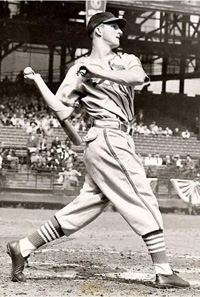
Stan Musial as a rookie
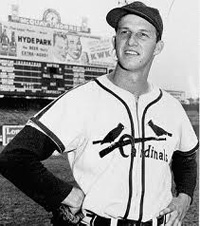
Stan Musial
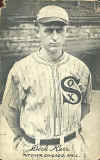
Dickie Kerr
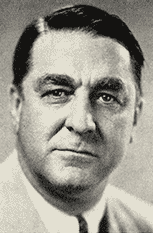
Branch Rickey
|
Late September, 1941:
- Stan Musial had been with the St. Louis Cardinals for all of four days after being called up from Rochester of the International League.
- It was the ninth inning of the first game of a doubleheader with the Chicago Cubs as the Cardinals chased the Brooklyn Dodgers for the NL pennant.
- Stan already had three hits when he came to the plate with the score tied 5-5.
In those days, a rookie with three hits could expect to be decked, and that's what happened.
- But Musial picked himself up from the dirt and lined a single to right center.
- An infield out sent him to second. Then Coaker Triplett dribbled a roller in front of the plate. C Clyde McCullough pounced on the ball and fired to first.
- As Musial streaked around third, he noticed that McCullough, torn between admiration for his own throw and indignation that the umpire had ruled Triplett safe, was neglecting to cover the plate. So Stan kept going and slid in with what turned out to be the winning run.
Afterwards, manager Billy Southworth said of his rookie: "That kid was born to play baseball." St. Louis didn't overhaul the Dodgers. But Stan hit .426 in 12 games to become a Redbird fixture until his retirement 22 years later.
To add to his story, he had begun the 1941 campaign at class C Springfield. Furthermore, he had been a pitcher in previous seasons.
Stan Musial was born of Polish immigrants in Donora PA in 1920.
- In high school, he starred not only in baseball but also in basketball, being picked as a forward on the All-Western Pennslvania high school team. Several colleges offered scholarships that Lukasz Musial considered his son's ticket to escape working in the steel mills.
- Andrew French, owner of the Monessen team in the Pennsylvania State Association, saw southpaw Stan strike out batter after batter for the Donora Zinc Works. So French visited the Musials to sign Stan to a pro contract. However, Lukasz didn't want his son to give up a college scholarship. When 16-year-old Stan started to cry, the old man relented.
Stanley's work at Williamson WV in the Mountain State League in 1938 and 1939 did not offer convincing evidence that he had made the right decision.
- He went 6-6 his first year.
- While he was 9-2 the next, he appeared in only 13 games.
Then in 1940 came the turning point in his pro career.
- He was assigned to Daytona Beach in the Class D Florida State League.
- The manager was Dickie Kerr, the White Sox hurler who won two games in the 1919 Fall Classic despite efforts by his teammates to throw the Series.
- Musial won 15 and lost only 5 as a pitcher.
- But, more importantly, Kerr appreciated his value as a hitter and employed him as a fly chaser when he wasn't pitching, a la the Red Sox with Babe Ruth.
However, on August 11, 1940, Stan's career received a jolt.
- Playing CF, he made a shoe string catch but fell heavily on his left shoulder.
- When a big knot formed, his career as a P ended, although he did try the mound twice more.
- He won the first game 5-4 on luck and guts but then was pounded by Orlando.
Recently married to his high school sweetheart, Lillian Labash, Stan found it difficult to support her on his $100 monthly salary, especially with a baby on the way.
- He took his troubles to his manager, asking if he should quit baseball and get a year-round job in the steel mill back home.
- Kerr urged Stan not to quit, assuring him that he would make it to the majors as an outfielder.
- Kerr and his wife also rented a larger home and took in Stan and his bride. When the baby was born, he was christened Richard Stanley Musial after Dickie Kerr.
Stan reported to the Cardinals' tryout camp at Columbus GA in the spring of 1941. Managers of six St. Louis farm clubs were looking for talent.
- Although they all could see that Stan could hit, they were reluctant because of his "dead" arm.
- Finally, Ollie Vanek, skipper of the Class C Springfield (MO) club, with a shortage of OFs, took a chance. Stan opened in RF and proceeded to tear up the league, batting .369 in 87 games with 24 doubles, nine triples, and 26 HRs.
- Also, his arm proved to be stronger than anticipated as he threw out many runners who tried to take advantage of his supposed lame wing.
- Manager Tony Kaufmann of Rochester of the International League, needing an OF, received approval from Branch Rickey, Cardinal GM who had masterminded the club's extensive farm system, to jump Musial from C to AA.
- In his first at-bat with his new club, Stan walloped a homer. By September, he had hit .327 in 51 games, prompting manager Billy Southworth to complete Stan's rise from Class C to the National League in one season.
The rest, as they say, is history. Stan amassed over 3,000 hits and 400 HRs and was elected to the Hall of Fame in 1968 as soon as the mandatory five-year wait after retirement ended. Thank you, Dickie Kerr, for saving my favorite all-time player's career.
|
Reference: "Rookie of the Year," J. Roy Stockton, The Saturday Evening Post, September 12, 1942
reprinted in the St. Louis Cardinals Yearbook 1962
|
|
"The Brat" Screws Up
Friday, July 24, 1953; Connie Mack Stadium
PHILADELPHIA (UP)—National League bench jockeys and managers were presented today with material that comes once in a lifetime — and none other than Manager Eddie Stanky of the St. Louis Cardinals was the victim. Stanky, who never will hear the end of it if he remains in baseball another 50 years, pulled the 'boner" of his career Friday night when he batted out of turn in a lineup he had made up himself! It happened in the first inning of a 2-1 loss to the Phillies. Stanky made out his batting order with himself batting first, Solly Hemus second and Stan Musial third and placed it on the dugout wall. But his pen—or his mind — slipped for a moment as he made out copies of the batting order for Philadelphia Manager Steve O'Neill and the umpires. In those he had Hemus hitting first and himself second. When the game started, Stanky walked up to lead off. He struck out. Then Hemus singled. As Musial reached the plate, O'Neill came out of the dugout and presented his copy of the batting order to the umpire. Sure enough, Stanky had pulled a "boner." Nobody was sure whether it was Stanky the player or Stanky the manager. But it didn't make any difference. Hemus was "out," losing a single ...
Follow up on the game: Musial stole home in 6th for the Cards' only run in the 2-1 loss.
Saturday, July 25, 1953
STANKY FINES SELF $50 - Eddie Stanky, the St. Louis Cardinals' manager, fined himself $50 for permitting a batting mixup last Friday night against the Philadelphia Phillies. Tbe money goes into a team fund. This is one thing the bench jockeys won't forget in years to come and they'll probably remind Stanky of it clear around the circuit.
|
How can a team have the best record in its division for the season and not go to the playoffs? Read on to see how that happened to the 1981 Cardinals.
Important steps to improve the team were taken near the end of the 1980 season and during the off-season.
- Cardinals GM John Claiborne fired manager Ken Boyer on June 8 and named Whitey Herzog to take the reins. Whitey had been let go by the Kansas City Royals at the end of the '79 season despite winning three straight AL West titles '76-77-78.
- On August 29, Whitey gave up the managerial post to become GM after August Busch fired Claiborne. I sure as heck didn't come here to be a general manager, Whitey said, but I can do more for the Cardinals as general manager than as field manager. His main duty was to select his successor in the dugout.
- However, on October 24, Herzog decided that the best candidate for the job was himself. So he filled both the manager and GM positions.
As GM, Whitey made some trades that set the Cardinals on the path that led to three NL championships during the 1980s.
- He signed free agent C Darrell Porter, who had played for him at Kansas City.
- He traded three players, including 1B Leon Durham and 3B Ken Reitz, to the Cubs for closer Bruce Sutter.
- Whitey sent C Ted Simmons and P Pete Vuckovich to the Brewers for four players, including Dave LaPoint, who become a solid left-handed starter.
- Herzog moved Ken Oberkfell from 2B to 3B and installed Tommy Herr at 2B.
The '81 edition of the Redbirds got off to a good start, then slumped.
- An eight-game winning streak helped produce a 12-3 record on May 3. On May 31, the Cardinals dropped from first to third in one day with a 6-1 loss at Philadelphia. Every loss to the Phillies would end up costing the Birds big time.
- St. Louis moved in and out of first place over the next two weeks as a midnight deadline on June 11 loomed to sign a new players agreement.
- On June 7, Whitey made another move, obtaining RHP Joaquin Andujar from the Astros, who were willing to take just one player, journeyman Tony Scott, to get the tempetuous Dominican off their roster. With improved control of both his pitches and his emotions, Andujar would win 68 games over five seasons for St. Louis.
- On the deadline day, the Cardinals defeated the Dodgers 2-1 at Busch Stadium. Both runs scored on RF George Hendrick's inside-the-park HR.
- However, the Phillies beat the Astros 6-4 to maintain a one-game lead over the Redbirds. No one knew it at the time, but Philly clinched a playoff berth with that victory.
The MLPA strike lasted 50 days before the two sides reached an agreement on July 31.
- Before play resumed on August 10, the owners voted to split the pennant races. The winners of the two halves would meet in an extra best-of-five playoff to determine the East and West champions in each league.
- Then the division winners would play another best-of-five for the pennant.
- Just as they started well in April, so Herzog's club got out of the gate fast in August. They started what was like a new season by taking three of four from the Phillies at Veterans Stadium. However, the wins did not affect the results of the first season.
The problems inherent in the split season are illustrated by this story.
- On April 29, the Cardinals and Cubs played a doubleheader on a cold, drizzly day at Wrigley Field. Chicago won the opener. However, the second game was suspended after 11 innings because of darkness. (No lights at Wrigley until 1988.)
- The game was scheduled to be resumed on July 3, the next time St. Louis came to town. However, that date was in the middle of the strike.
- So the clubs rescheduled the continuation for September 21. However, wrangling over whether the result would count for the first half or the second half caused the league to call the game a tie.
On August 26, the Cards stood at 9-5 for the second half when an ugly incident had a major impact on the pennant race.
- SS Garry Templeton asked for a day off, saying he was too tired to play. But Herzog, probably wondering how you could be so tired after only 14 games, put him in the lineup.
- In the first inning, Templeton struck out, but the C dropped the ball. Garry jogged part of the way to 1B, then veered toward the dugout. As he did so, he shot two birds at the booing fans.
- When Garry got himself ejected in the 4th inning, Whitey accosted him as he reached the dugout, grabbing his shirt and backing him aainst the wall before players separated them.
- Herzog fined Templeton $5,000 and suspended him indefinitely. The next day, the SS began treatment for depression.
Templeton returned from his suspension with a bang.
- He collected four hits in five at-bats in a 3-2 win over the Expos in Montreal on September 15.
- Porter hit a grand slam on September 17 to help defeat Montreal 7-4 and extend the Cards' lead in the East to 3 1/2 games with 17 to go.
- But the Redbirds lost seven of the next eight to fall out of first place.
- On September 29, they regained the top spot by half a game with a home win over the Expos. But they dropped back behind Montreal the next day when they lost 8-5 in Philly.
- Four games remained, all on the road for each team. Here's the day-by-day results with the second-half records.
| Cardinals |
Record |
Date |
Expos |
Record |
| @Phillies 3-2 |
27-22 |
Oct. 1 |
@Pirates 5-2 |
28-22 |
| @Pirates 7-8 |
27-23 |
Oct. 2 |
@Mets 3-0 |
29-22 |
| @Pirates 8-3 |
28-23 |
Oct. 3 |
@Mets 5-4 |
30-22 |
| @Pirates 4-0 |
29-23 |
Oct. 4 |
@Mets 1-2 |
30-23 |
- As you can see, St. Louis lost by half a game. One more win anywhere along the way would have put them into a tie with the Expos.
So the first half champion, Philadelphia, played the second half champion, Montreal, in the first round of the playoffs. The Expos won in five games, then lost to the Dodgers in five for the NL pennant.
But here's the NL East standings for the complete season.
| Team |
Record |
Pct. |
GB |
| St. Louis |
59-43 |
.578 |
--- |
| Montreal |
60-48 |
.556 |
2 |
| Philadelphia |
59-48 |
.551 |
2.5 |
| Pittsburgh |
46-56 |
.451 |
13 |
| New York |
41-62 |
.398 |
18.5 |
| Chicago |
38-65 |
.369 |
21.5 |
The crowning grace of the disrupted '81 campaign was that, with some more personnel moves - chiefly trading Templeton to San Diego for Ozzie Smith - Herzog produced an '82 Cardinal team that won the World Series.
Reference: Cardinals Journal, John Snyder (2010)
|
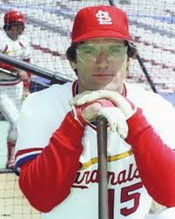
Darrell Porter
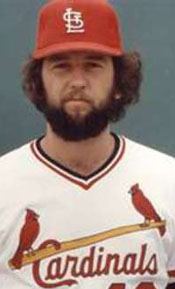
Bruce Sutter
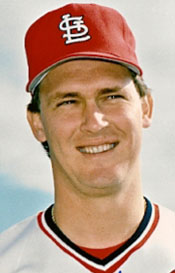
Tommy Herr
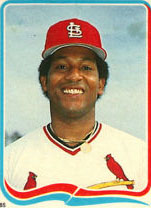
Joaquin Andujar
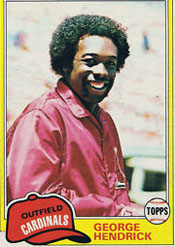
George Hendrick
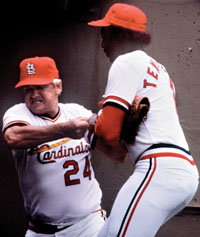
Whitey Herzog grabs Garry Templeton
|
|








